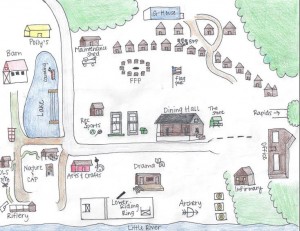All I Needed to Know I Learned as a WIT

by Tori Cook, WIT 2016
Coming back for WIT year (Worker-In-Training) was a decision that I struggled with. Being a WIT is not something you just decide to do on a whim. It’s a significant time commitment, at a time in life when time is hard to find with college applications, internships, service, clubs, and sports. Most of my friends didn’t understand my decision to go to camp when I could be interning at NASA or earning more money or going to the beach or applying to colleges like they were. However, I’m so glad I decided to be a WIT because I got so much closer with my fellow WITs, I learned professional and interpersonal skills, and I had an unforgettable experience.
Coming back as a WIT, I felt extremely nervous and extremely excited. I was nervous because I was going into the program as a 16 year old, and I didn’t know if the campers and my fellow counselors would take me seriously. I was also nervous because I had no experience as a counselor and I was always asking questions. I was excited because I had most of the tools from CIT year and I would finally be able to use them.

Flexibility/Adaptability
Whether it’s rain, campers, or equipment, something unexpected almost always complicates your well-laid plans. In facing unexpected challenges, like a thunderstorm that terrifies campers or trying to plan a camp-wide game of kickball with only two balls, I learned to roll with the punches and adapt to changing situations. While it’s always good to have a backup plan, it’s impossible to plan for every eventuality. Being able to quickly and calmly change plans is a great skill to have at camp and in life.
Strength in Diversity
My co-counselor Lena, who was from Germany, and I were very different. At first, the language and cultural divides made it difficult for us to work together. However, I believe that differences should be viewed as an asset instead of a setback. Inclusion is what makes Carysbrook so special. When we work with others that are different than us, we learn so much. Being so different than Lena meant that we thought differently. We each had different ideas and different ways to solve a problem. This proved to be extremely beneficial in our cabin, and I’m so glad I got to work with her. It’s easy to let differences divide you, but WIT year taught me how important it is to let differences unite you.
Accountability
One of the ways I changed between my CIT year and my WIT year is I became much more accountable. As a CIT I was always working in a group, whether it was on Banquet or our service project, and responsibility was shared. I always did my part, but I never really understood what it meant to be accountable until I got to WIT year and I was on my own. Suddenly I had to be responsible for two activities, six campers, and a service project. I learned not only how to do what was expected of me, but to take responsibility and find a solution when I couldn’t.
Camp is for the campers
At face value, this seems obvious. Camp is all about the campers. What I discovered in my year as a WIT is that creating fun for the campers ends up being the most fun of all.
Transitioning from CIT summer to WIT summer is interesting because it’s not what you expect at all. From CIT year, I knew all the buzzwords: engagement, awareness, communication, collaboration, camp is for the campers, etc., but WIT year helped me apply them. If CIT year was learning to speak Spanish, WIT year was living in Spain.
The CIT program was just what I needed to be confident in my WIT year, but still left so much room for growth. At a time of transition in my life, my WIT experience was exactly what I needed. I took away so many lessons from my WIT experience, ones that I am able to use even outside the camp community. The flexibility, accountability, communication, and empathy I learned at camp will help me for the rest of my life. All CITs need to come back for their WIT year to truly understand what camp really means, and to gain skills that will serve them long after they leave the 200 acre woods.




